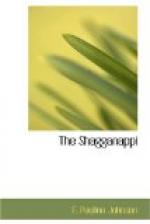We-hro would have scowled blackly if anyone had dared to name him a heathen. He thoroughly ignored the little Delaware boys, whose fathers worshipped idols fifty years ago, and on all the feast days and dance days he would accompany his parents to the “Longhouse” (which was their church), and take his little part in the religious festivities. He could remember well as a tiny child being carried in his mother’s blanket “pick-a-back,” while she dropped into the soft swinging movement of the dance, for We-hro’s people did not worship their “Great Spirit” with hymns of praise and lowly prayers, the way the Christian Indians did. We-hro’s people worshipped their God by dancing beautiful, soft, dignified steps, with no noisy clicking heels to annoy one, but only the velvety shuffle of the moccasined feet, the weird beat of the Indian drums, the mournful chanting of the old chiefs, keeping time with the throb of their devoted hearts.
Then, when he grew too big to be carried, he was allowed to clasp his mother’s hand, and himself learn the pretty steps, following his father, who danced ahead, dressed in full costume of scarlet cloth and buckskin, with gay beads and bear claws about his neck, and wonderful carven silver ornaments, massive and sold, decorating his shirt and leggings. We-hro loved the tawny fringes and the hammered silver quite as much as a white lady loves diamonds and pearls; he loved to see his father’s face painted in fierce reds, yellows and blacks, but most of all he loved the unvarying chuck-a, chuck-a, chuck-a of the great mud-turtle rattles that the “musicians” skilfully beat upon the benches before them. Oh, he was a thorough little pagan, was We-hro! His loves and his hates were as decided as his comical but stately step in the dance of his ancestors’ religion. Those were great days for the small Onondaga boy. His father taught him to shape axe-handles, to curve lacrosse sticks, to weave their deer-sinew netting, to tan skins, to plant corn, to model arrows and—most difficult of all—to “feather” them, to “season” bows, to chop trees, to burn, hollow, fashion and “man” a dugout canoe, to use the paddle, to gauge the wind and current of that treacherous Grand River, to learn wild cries to decoy bird and beast for food. Oh, little pagan We-hro had his life filled to overflowing with much that the civilized white boy would gave all his dimes and dollars to know.
And it was then that the great day came, the marvellous day when We-hro discovered his second self, his playmate, his loyal, unselfish, loving friend—his underbred, unwashed, hungry, vagabond dog, born white and spotless, but begrimed by contact with the world, the mud, and the white man’s hovel.
It happened this way:




